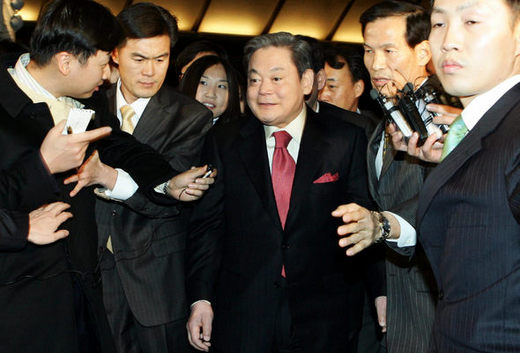
“It is increasingly getting more serious. Education matters. We should produce geniuses by properly educating the gifted.”
Later in the interview he said,
“One genius feeds 100,000 persons,”
One reporter asked the electronics giant’s head about domestic education. He said,
“it is too uniform. We should educate children according to the needs of the 21st century. [In education], Korea should model itself after advanced countries,”
I’m not exactly sure what he means by this. What do you think?
“Samsung Head Stresses Need for Korean Educational Reform.” The Hankyoreh 2 Jun 2007 2 Jun 2007 <http://english.hani.co.kr/arti/english_edition/e_business/213469.html>.

I also wonder what he means. I keep hearing about how advanced Korea is! If he is referring to education systems, I hope he isn’t looking this way !-)
He’s not an educator. He’s a corporate executive. So perhaps he doesn’t even know what he means. But let’s pretend that we are leaders in the North Korean Ministry of Education, and such a personage has just made this very public and published statement. How might we spin the statement to point to education reform for the 21st century?
I think I understand what he meant since I was educated up to college in Korea. The most important thing for K-12 Korean students is getting into a college by passing a national college entrance exam that is given once a year in winter. If a student fails the test, he/she needs to cram for the exam again. If a student doesn’t get high scores to apply for one of the top universities in Korea, then he/she may decide to take the exam again next year. Because one’s life depends on this national college exam, teachers, students, and parents do everything they can for the exam. Therefore, “differentiated instruction” or “ability grouping” is not something you see, at least I experienced, in the Korean classrooms. Having said that, I think what Lee Kun-hee meant by “Korea should model itself after advanced countries” is that Korean education system should provide students with opportunities (gifted education, extended learning, etc) or alternative choices (arts, sports, music, etc.) to excel what he/she is good at, and that these opportunities/choices should be given at the early stages of K-12 education.
Why don’t we ask these questions of our politicians, business execs an the same 6 people who comprise every self-important committee in educational technology? Have you read the hooey being sold as “21st Century skills” in this country?
Mr. Lee Kun-hee makes the familiar error in setting education policy – find what isn’t working and do a lot more of it. “Gifted” education is what you do when your system cannot manage to treat every student as an individual capable of learning to their fullest potential. So, Korea has a national curriculum, creates a handful of winners and many more losers and the prescription for the future is to create ever fewer super-winners and many more losers. BRAVO!
Thanks for electronic media, it will not be long until every education critic in the world can recite the mantra generated by our presidential candidates (regardless of party) when asked for their education platform.
Press 2 for “We need to increase teacher pay, but hold them accountable.”
To me he seems to be saying that there is not enough individualized education for students in Korea. We see the same thing here in the United States. By trying to make everything equitable we seem to lose the ability to push the higher level students, the ones that are going to be the innovators, “the geniuses”. We have this “bridge the gap” mentality with our students, trying to bring the low-level students to higher levels. My concern is that we have bridged the gap, but we have done it in a way that has brought the higher level students down to the level of the lower students. It looks good on paper, but doesn’t really have any benefit to the student or society. I believe it is good to have every student achieve, but we have to realize that each student is going to achieve differently and we cannot expect each student to accomplish the same goals. If we do we end up lowering our standards and in reality the more gifted student is the one that becomes neglected.